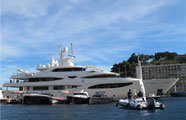Unbridled growth needs to be checked
Updated: 2011-09-30 09:16
By Zhang Yaoguang (China Daily)
|
|||||||||
New regulations will help put theme park industry on a strong footing
During the past 20 years, some 2,500 theme parks have sprung up in China, but only a handful of them can be deemed successful.
Though the failure ratio has been relatively high, going by the number of new projects announced in recent times it is clear that investors still believe there is huge untapped potential in the theme park market.
At the same time, the ban enforced by the government on construction of large theme parks in August this year will lead to a healthy and constructive development of the industry.
The genesis of the industry can be traced back to the reform and opening-up policy in the 1980s. As an offshoot of the policy, disposable incomes of Chinese citizens have started increasing and with it their desire for more wholesome entertainment options.
In 1989, Splendid China, a miniature landscape that mirrors the most famous architecture in China, was set up in Shenzhen to cater to the entertainment needs of consumers. Splendid China received 3 million visitors in its first year of operation, while the returns in the same period more than offset the initial investment of 100 million yuan ($15.6 million).
With such high returns on investment, the theme park industry was poised for a takeoff in China. Many new projects appeared on the horizon, and by the end of 1996 there were as many as 23 Splendid China parks, 18 other miniature landscapes and hundreds of other theme parks.
Sadly, most of the projects have failed to recoup their investments, reeled under consistent losses and in some cases gone bankrupt and shuttered operations.
According to data from the China Tourism and Attractions Summit, nearly 70 percent of the 2,500 theme parks that opened in the past 20 years have ended up losing money, while those that made profit was less than 10 percent.
There are several reasons why the failure rate has been high in the theme park industry.
The primary reason is that there was no proper scrutiny of the investments. Most of the investment deviated from market reality and demand and veered more on the lines of being "big and cool".
Competition among the players intensified as companies started to look like clones of each other. The huge capital outlays for land and the long construction periods crimped subsequent capital flows, thereby putting a strain on profits. Many of these firms lacked a proper operating system, while high-ticket prices proved to be barriers for Chinese consumers.
All of these have given rise to the moot question of the way forward for the industry and the growth model to stay sustainable.
According to the National Tourism Administration, revenue from domestic tourism exceeded 1 trillion yuan last year. It is estimated that theme parks could garner a big chunk of the domestic tourism revenue in the future as they offer diverse entertainment options.
According to the World Tourism Organization, China is expected to be the world's biggest tourist destination by 2020, attracting more than 140 million visitors. Economics Research Associates (ERA) said that more than 100 million visitors potential is yet to be developed in Chinese theme parks.
In recent times, local governments, enterprises and global and domestic design firms have started to get involved in theme park planning, construction, equipment purchase, installation and operation.
The local government of Xuzhou, in Jiangsu, and Suzhou National New & High-tech Industrial Development Zone have examined in June the feasibility of Pengcheng Happy World park with a planned investment of 6 billion yuan.
Real estate giant Dalian Wanda has decided to set up five theme parks in China with 2 billion yuan investment each.
However, it has been revealed that some developers are using theme parks as an excuse to secure cheap land.
In August, the government enforced a ban on theme park construction, including parks that have already been approved but haven't started construction, until the explicit policies to regulate theme park development are put in place.
The suspension of theme park construction is a form of protecting national land resources, legal real estate developers and helpful for the healthy development of the theme park industry.
The impending government regulations will help build reasonable layouts for theme parks nationwide, help improve tourism-related infrastructure construction and prevent the bursting of a massive theme park bubble in the future.
Guided by the new regulations, the newly planned theme parks will cater better to consumer needs and promote healthy development of China's tourism sector.
The author is director of the management department of the China Association of Amusement Parks and Attractions.
(China Daily 09/30/2011 page7)










